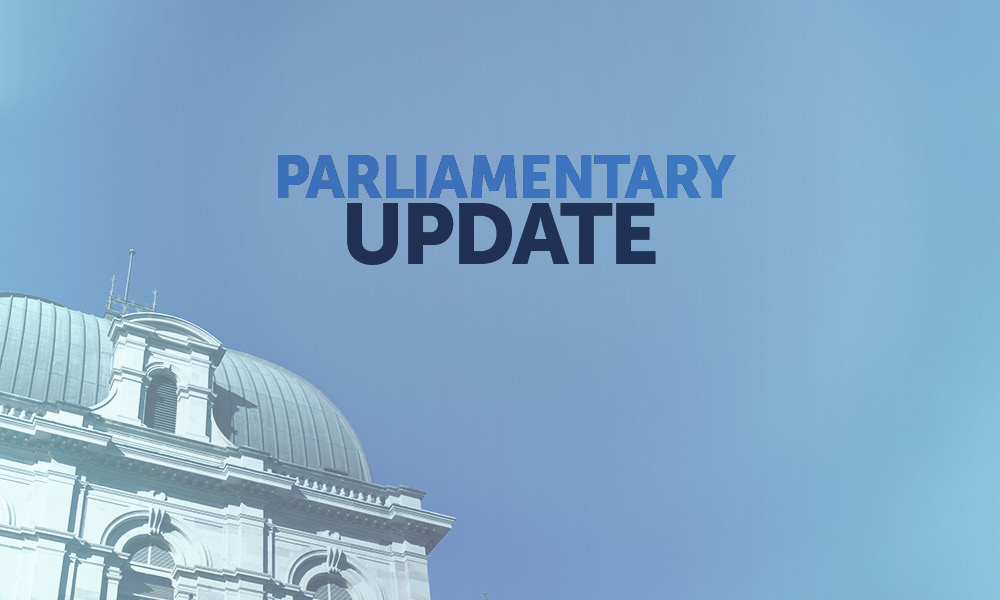Queensland Parliament sat from 21 February to 23 February 2023.
It was a significant week with the introduction of legislation to support the Path to Treaty, youth justice reforms, and the new Property Law Bill 2023.
Bills introduced
The following Bills were introduced into the Legislative Assembly:
- Path to Treaty Bill 2023
- Police Powers and Responsibilities and Other Legislation Amendment Bill 2023
- Property Law Bill 2023
- Strengthening Community Safety Bill 2023
- Waste Reduction and Recycling and Other Legislation Amendment Bill 2023
Path to Treaty Bill 2023
On 22 February 2023, the Premier and Minister for the Olympic and Paralympic Games, Annastacia Palaszczuk, introduced the Path to Treaty Bill 2023.
The objectives of the Bill are to establish:
- a First Nations Treaty Institute to support Aboriginal and Torres Strait Islander peoples to develop and provide a framework for Aboriginal and Torres Strait Islander peoples to prepare for and then commence treaty negotiations with the Queensland Government, and
- a Truth-telling and Healing Inquiry to inquire into, and report on, the effects of colonisation on Aboriginal and Torres Strait Islander peoples.
The Bill amends the:
- Aboriginal and Torres Strait Islander Communities (Justice, Land and Other Matters) Act 1984
- Fire and Emergency Services Act 1990
Useful resources:
The Bill was referred to the Community Support and Services Committee for inquiry. Submissions to the inquiry will close on 17 March 2023. For further details regarding the inquiry process, visit the committee’s website.
Police Powers and Responsibilities and Other Legislation Amendment Bill 2023
On 21 February 2023, the Minister for Police and Corrective Services and Minister for Fire and Emergency Services, Mark Ryan, introduced the Police Powers and Responsibilities and Other Legislation Amendment Bill 2023.
The objective of the Bill is to promote the efficiency of the Queensland Police Service (QPS) and the Queensland Fire and Emergency Services (QFES) through a range of amendments that will deliver operational or administrative improvements.
In relation to the QPS, amendments in the Bill will:
- Enhance the Police Drug Diversion Program through introducing drug diversion warnings, allowing an eligible person to participate in a subsequent drug diversion assessment program, and the expansion of minor drug offences to include the possession of prescribed quantities of any type of dangerous drug and certain pharmaceuticals.
- Allow for the appointment of a person as an executive officer rather than to an executive officer position, which will allow executive officers (that is, Assistant and Deputy Commissioners) to be appointed generically to their respective rank, or to the particular position they will fill.
- Introduce a circumstance of aggravation for the offence of evading police under section 754 of the Police Powers and Responsibilities Act 2000.
The Bill will make minor amendments to legislation administered by QFES by:
- confirming any request or application made under sections 64 (Prohibition by commissioner against lighting of fires) and 65 (Granting of permits) of the Fire and Emergency Services Act 1990 (FES Act) must contain the information prescribed by regulation and, in the case of a request under section 64, be made in the way prescribed by regulation
- introducing the new section 150BA (Assault of persons performing functions or exercising powers) of the FES Act and making consequential amendments to the offence outlined in section 150C (Obstruction of persons performing functions).
The Bill will also amend the maximum penalty of section 5 (Trafficking in dangerous drugs) of the Drugs Misuse Act 1986 from 25 years’ imprisonment to life imprisonment, to reflect the serious nature of this offence.
The Bill amends the:
- Drugs Misuse Act 1986
- Fire and Emergency Services Act 1990
- Penalties and Sentences Act 1992
- Police Powers and Responsibilities Act 2000
- Police Service Administration Act 1990
- Youth Justice Act 1992
- legislation mentioned in schedule 1 of the Bill.
Useful resources:
The Bill was referred to the Legal Affairs and Safety Committee for inquiry. Submissions to the inquiry will close at midday on 10 March 2023 and a public hearing is scheduled to be held on 20 March 2023. For further details regarding the inquiry process, visit the committee’s website.
Property Law Bill 2023
On 23 February 2023, the Minister for Attorney-General and Minister for Justice, Minister for Women and Minister for the Prevention of Domestic and Family Violence, Shannon Fentiman, introduced the Property Law Bill 2023.
The primary objective of the Bill is to replace the Property Law Act 1974 (PLA) with a new, modernised property law Act, drafted broadly in accordance with recommendations of the ‘Property Law Act 1974 – Final Report (2018)’ prepared by the Commercial and Property Law Research Centre at Queensland University of Technology (QUT).
Notably, the Bill implements a new statutory seller disclosure scheme drafted broadly in accordance with the recommendations of the ‘Final Report: Seller Disclosure in Queensland (2017)’ also prepared by QUT. In generally adopting this report’s recommendations, the Bill will create a more certain, coordinated and transparent regime for the sale of freehold land in Queensland by promoting consistency and clarity of disclosure. It will also simplify and consolidate the current obligations under the common law, statute and contract.
The Bill achieves the policy objectives by:
- repealing outdated or unnecessary provisions in the PLA
- redrafting the provisions in modernised language
- providing a legal framework that is updated to reflect changes associated with electronic dealings in property and electronic service, as well as reflecting current property, titling and conveyancing practice
- simplifying and updating various provisions, for example, the rule against perpetuities, leases and covenants
- minimising the inadvertent creation of instalment contracts, and
- implementing a statutory seller disclosure scheme that clarifies the disclosure obligations of a seller, requires a transparent and consolidated form of disclosure and provides information of value to a buyer’s decision to purchase.
The following draft regulations were also tabled with the Bill. The draft regulations will be subject to further consultation but were tabled in order to provide an overview of the seller disclosure approach:
- Draft Property Law Regulation 2023, No. xx
- Draft Body Corporate and Community Management and Other Legislation Amendment Regulation 2023, No. xx
The Bill amends the:
- Body Corporate and Community Management Act 1997
- Building Units and Group Titles Act 1980
- Land Title Act 1994
- Limitation of Actions Act 1974
- Property Occupations Act 2014
- Acts mentioned in schedule 3 of the Bill.
The Bill repeals the:
- Property Law Act 1974
Useful resources:
The Bill was referred to the Legal Affairs and Safety Committee for inquiry. Submissions to the inquiry will close at midday on 10 March 2023 and a public hearing is scheduled to be held on 21 March 2023. For further details regarding the inquiry process, visit the committee’s website.
Strengthening Community Safety Bill 2023
On 21 February 2023, the Minister for Police and Corrective Services and Minister for Fire and Emergency Services, Mark Ryan, introduced the Strengthening Community Safety Bill 2023.
The Queensland Law Society made a submission in response to the Bill, raising a number of concerns about the approach in the Bill. QLS also appeared before the Economics and Governance Committee at the public hearing on 28 February 2023.
The objective of the Bill is to give effect to legislative reforms announced by the Queensland Government on 29 December 2022 aimed at keeping the community safe, and to strengthen youth justice laws to respond to serious repeat offenders.
The Bill intends do so by:
- increasing the maximum penalty for unlawful use or possession of motor vehicles, aircraft or vessels from seven to ten years’ imprisonment
- creating new circumstances of aggravation for the offence of unlawful use or possession of motor vehicles, aircraft of vessels where:
- the offender has published material advertising their involvement in or of the offending on social media
- where the offending occurs at night
- where the offender uses or threatens violence, is or pretends to be armed, is in company and damages, or threatens to damage, any property
- providing that it is an offence for children to breach a condition of their bail undertaking
- extending and expanding the trial of electronic monitoring as a condition of bail for a further two years and to include eligible 15-year-olds
- removing the requirement that police consider alternatives to arrest if they reasonable suspect a child on bail for a prescribed indictable offence, or certain domestic violence offences have contravened, or are contravening, a bail condition
- providing that a child’s bail history must be taken into account during sentencing
- creating the ability of a sentencing court to declare that a child offender is a serious repeat offender in certain circumstances, to enable considerations such as community safety to be paramount
- enabling conditional release orders to operate for a greater period of time
- ensuring certain child offenders serve their suspended term of detention if they breach their conditional release orders
- expanding the list of offences included within the definition of ‘prescribed indictable offence’ to facilitate greater operation of provisions of the Youth Justice Act 1992 aimed at serious repeat offenders, including the presumption against bail provision under section 48AF and the new sentencing regime for children declared serious repeat offenders
- enabling the transfer of persons who have turned 18 on remand and the earlier transfer of persons who have turned 18 serving a sentence, from youth detention centres to adult correctional centres
- ensuring the continuation of multi-agency collaborative panels which provide intensive case management and holistic support for young persons identified as high risk, or requiring a collaborative response through a multi-agency and multi-disciplinary approach.
The Bill amends the:
- Bail Act 1980
- Queensland Criminal Code
- Police Powers and Responsibilities Act 2000
- Youth Justice Act 1992
Useful resources:
- Bill
- Explanatory note
- Statement of compatibility
- Explanatory speech
- Committee
- Statement about exceptional circumstances
The Bill was referred to the Economics and Governance Committee for inquiry. Submissions to the inquiry closed on Friday 24 February 2023 and a public hearing was held on 28 February 2023. For further details regarding the inquiry process, visit the committee’s website.
Waste Reduction and Recycling and Other Legislation Amendment Bill 2023
On 22 February 2023, the Minister for the Environment and the Great Barrier Reef and Minister for Science and Youth Affairs, Meaghan Scanlon, introduced the Waste Reduction and Recycling and Other Legislation Amendment Bill 2023.
The objectives of the Bill are to:
- enable a thing to be prescribed by regulation to not be a waste, and move the definition of waste from the Environmental Protection Act 1994 (EP Act) to the Waste Reduction and Recycling Act 2011 (WRR Act)
- remove the automatic levy exemption for clean earth and remove the definition of clean earth, to take effect from 1 July 2023
- ban the outdoor release of any number of lighter-than-air balloons, from 1 September 2023
- enable the chief executive to make a decision about amending or suspending a resource recovery area declaration
- enable the chief executive to make a decision about making a payment to a local government to mitigate direct effects of the waste levy on households in a local government area
- include the circular economy principle as a principle under the WRR Act
- change the review date for the state’s waste strategy from three to five years
- set an expiry date of 31 December 2025 for the exemption from the ban for a single-use plastic item that is an integral part of a shelf-ready product (such as a plastic straw attached to a juice box).
The Bill includes consequential amendments to the Biosecurity Act 2014 and the Rural and Regional Adjustment Regulation 2011 as a result of moving the definition of waste from the EP Act to the WRR Act.
The Bill amends the:
- Environmental Protection Act 1994
- Waste Reduction and Recycling Act 2011
- the legislation mentioned in schedule 1 of the Bill.
Useful resources:
The Bill was referred to the Health and Environment Committee for inquiry. Submissions to the inquiry will close at 10am on 10 March 2023 and a public hearing is scheduled to be held on 27 March 2023. For further details regarding the inquiry process, visit the committee’s website.
Legislation passed this Parliament
The following legislation was passed by the Legislative Assembly:
- Domestic and Family Violence Protection (Combating Coercive Control) and Other Legislation Amendment Act 2023
- Land and Other Legislation Amendment Act 2023
Domestic and Family Violence Protection (Combating Coercive Control) and Other Legislation Amendment Act 2023
On 14 October 2022, the Attorney-General and Minister for Justice, Minister for Women and Minister for the Prevention of Domestic and Family Violence, Shannon Fentiman, introduced the Domestic and Family Violence Protection (Combating Coercive Control) and Other Legislation Amendment Bill 2022.
The Bill was passed with amendment on 22 February 2023 and assented to on 28 February 2023, becoming Act No.1 of 2023.
The objectives of the Act are to:
- Give effect to legislative reform in recommendations 52-60 and 63-66 of the Women’s Safety and Justice Taskforce in Chapter 3.8 of its first report, ‘Hear her voice – Report one – Addressing coercive control and domestic and family violence in Queensland’.
- Modernise and update sexual offence terminology in the Criminal Code in response to advocacy that the language appropriately reflects criminal conduct.
- Address stakeholder concerns regarding the operation of the sexual assault counselling privilege framework, in relation to the standing of counsellors and victims and alleged victims of sexual assault offences.
- Amend the Youth Justice Act 1992 to provide specific mitigatory circumstances relating to domestic violence.
- Amend the Coroners Act 2003 to remove the limitation upon the number of terms of re-appointment of the State Coroner and the Deputy State Coroner.
- Amend the Oaths Act 1867 to address issues that have arisen in the implementation of the Justice and Other Legislation Amendment Act 2021 in relation to affidavits and statutory declarations.
- Amend the Telecommunications Interception Act 2009 to enable the Public Interest Monitor to perform the role intended under the international production order scheme in relation to applications for interception IPOs.
Amendments were moved during consideration in detail to achieve its policy objectives by amending the Public Guardian Act 2014 to:
- remove the three-year cap on appointment of community visitors under section 113(1)
- retain the ability for the Public Guardian to appoint community visitors on a casual basis under section 109, and
- provide a clear legislative basis for the temporary and permanent appointment of community visitors on a full-time or part-time basis.
The Act amends the:
- Coroners Act 2003
- Queensland Criminal Code
- Domestic and Family Violence Protection Act 2012
- Evidence Act 1977
- Oaths Act 1867
- Penalties and Sentences Act 1992
- Telecommunications Interception Act 2009
- Youth Justice Act 1992
- legislation mentioned in schedule 1 of the Bill.
Queensland Law Society provided a submission on the Bill.
Useful resources:
- Parliamentary report
- Bill
- Explanatory note
- Statement of compatibility
- Explanatory speech
- Committee
- Amendment in Committee – Government agreed
- Amendment in Committee – explanatory note
- Amendment in Committee – statement of compatibility
Land and Other Legislation Amendment Act 2023
On 17 March 2022, the Minister for Resources, Scott Stewart, introduced the Land and Other Legislation Amendment Bill 2022.
The Bill was passed with amendment on 23 February 2023 and assented to on 28 February 2023, becoming Act No.2 of 2023.
The policy objectives of the Act are to ensure the regulatory frameworks within the resources portfolio remain efficient, effective, and responsive to change. To that end, the Act:
- corrects minor technical errors in the Acquisition of Land Act 1967 that were identified because of a court judgment
- corrects an outdated definition of landholder of the land in the Cape York Peninsula Heritage Act 2007
- amends the Central Queensland Coal Associates Agreement Act 1968 to enable a variation of the Central Queensland Coal Associates Agreement
- amends the Land Act 1994 and Land Regulation 2020 to:
- introduce an alternative, more efficient pathway to initiate lease conversion, giving the chief executive an opportunity to act proactively in the allocation of state land
- streamline administrative processes for certain dealings affecting defence land, and
- simplify, streamline, and clarify policy intent for certain matters about road closures, decisions not to renew leases, right line tidal boundaries, and payment for improvements when a lease has been forfeited, surrendered, or expired
- modernises outdated requirements in the Land Act 1994, Place Names Act 1994, Stock Route Management Act 2002 and Vegetation Management Act 1999 to publish notices in newspapers, instead allowing this to occur by suitable media channels
- amends the Stock Route Management Act 2002 to both improve recovery of costs local governments incur managing and administering the stock route network, and overall simplify processes for stock route management
- amends the Stock Route Management Regulation 2003 to take into account new stock route decision-making and mapping provisions under the Act
- streamlines the process to commence survey standards, and clarifies policy intent and application of the ambulatory water boundary framework in the Survey and Mapping Infrastructure Act 2003 and the regulations
- improves the administrative process for listing regional ecosystems and clarifies the policy intent of certain provisions in the Vegetation Management Act 1999
- repeals the Foreign Governments (Titles to Land) Act 1948, Starcke Pastoral Holdings Acquisition Act 1994 and the Yeppoon Hospital Acquisition Act 2006.
Amendments were moved during consideration in detail to achieve its policy objectives by:
- correcting a minor error relating to the commencement of a Vegetation Management Act 1999 (Vegetation Management Act) and a Stock Route Management Act 2022 provision
- broadening the operation of the rent deferral provisions within the Mineral Resources Act 1989 for specific critical mineral mining leases that commenced on 21 November 2022, and
- re-establishing a level of parliamentary oversight in relation to the identification of regional ecosystems and their class under the Vegetation Management Act.
The Bill amends the:
- Acquisition of Land Act 1967
- Cape York Peninsula Heritage Act 2007
- Central Queensland Coal Associates Agreement Act 1968
- Land Act 1994
- Land Regulation 2020
- Land Title Act 1994
- Mineral Resources Act 1989
- Place Names Act 1994
- Stock Route Management Act 2002
- Survey and Mapping Infrastructure Act 2003
- Survey and Mapping Infrastructure Regulation 2014
- Vegetation Management Act 1999
- legislation mentioned in schedule 1 of the Bill.
The Bill repeals the:
- Foreign Governments (Titles to Land) Act 1948
- Starcke Pastoral Holdings Acquisition Act 1994
- Survey and Mapping Infrastructure (Survey Standards) Notice 2021
- Survey and Mapping Infrastructure (Survey Standards—Requirements for Mining Tenures) Notice (No. 1) 2011 and the Yeppoon Hospital Site Acquisition Act 2006.
Other useful resources:
- Parliamentary report
- Bill
- Explanatory note
- Statement of compatibility
- Explanatory speech
- Committee
- Amendment in Committee – Government agreed
- Amendment in Committee – explanatory note
- Amendment in Committee – statement of compatibility
- Exp note – erratum
Second reading
Working with Children (Indigenous Communities) Amendment Bill 2021
On 21 February 2023, the second reading for the Working with Children (Indigenous Communities) Amendment Bill 2021 (private members’ bill) was adjourned.
Useful resources:
Subordinate legislation
Subordinate Queensland Legislation notified in 2022 is available online.
Subordinate Legislation notified on the Queensland Legislation website from 27 January 2023 to 24 February 2023:
- SL No.1 of 2023: Public Trustee (Interest Rate) Amendment Regulation 2023
- SL No.2 of 2023: Health Legislation Amendment Regulation 2023
- SL No.3 of 2023: Biosecurity (Varroa Mite and Other Matters) Amendment Regulation 2023
- SL No.4 of 2023: Transport Legislation Amendment Regulation 2023
- SL No.5 of 2023: Public Records (Commission of Inquiry into Queensland Police Service Responses to Domestic and Family Violence) Amendment Regulation 2023
- SL No.6 of 2023: Medicines and Poisons (Medicines) Amendment Regulation 2023
- SL No.7 of 2023: Public Trustee (Interest Rate) Amendment Regulation (No. 2) 2023
- SL No.8 of 2023: Proclamation—Police Service Administration and Other Legislation Amendment Act 2022 (commencing remaining provisions)
- SL No.9 of 2023: Public Sector Regulation 2023
- SL No.10 of 2023: Proclamation—Integrity and Other Legislation Amendment Act 2022 (commencing certain provisions)
- SL No.11 of 2023: Legal Aid Queensland Regulation 2023
Queensland Government Gazette
The Queensland Government Gazettes for 2023 are available online.
Parliamentary sitting dates
As indicated on the parliamentary website, the Queensland Parliament is currently scheduled to next sit on 14 March 2023 to 16 March 2023.








2 Responses
Interesting to see the Property Law Bill introduced. But I must say, it is passing strange that this modernising bill still provides (for example) that freeholders seized of an estate in fee simple will continue to be tenured in ‘free and common socage’ — s 15.
This means (I believe) that King Charles II will not be able to require that a Queensland freeholder provide a certain number of armed horsemen in the event of war (an incident of fee simple tenure by way of knight’s service) and can — I think — only require that certain agricultural services be provided, if demanded, for the demesne of his Majesty’s estate.
Are we absolutely positive this is a modernising piece of legislation?
That should be Charles III, of course.